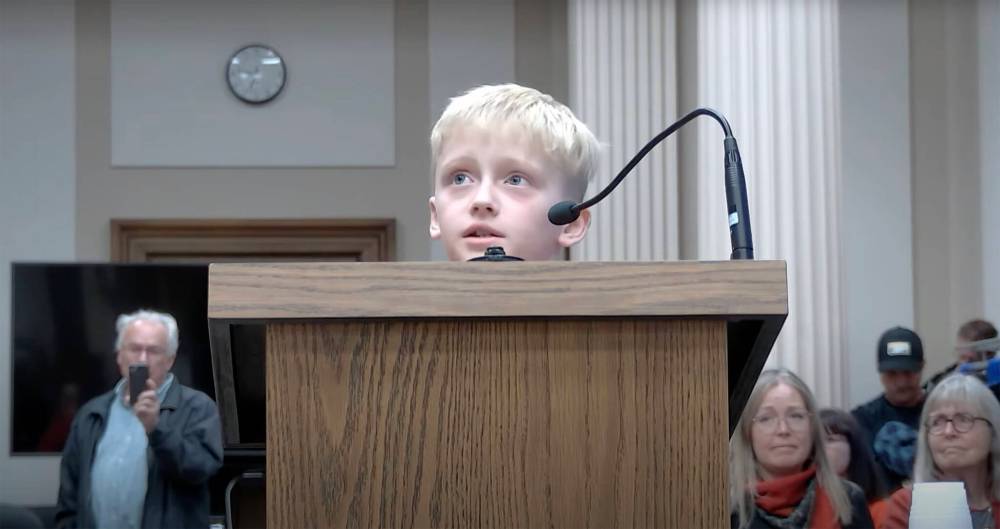‘Teachers didn’t teach me right’: boy with dyslexia among dozens who back Manitoba literacy screening bill
Advertisement
Read this article for free:
or
Already have an account? Log in here »
To continue reading, please subscribe:
Monthly Digital Subscription
$1 per week for 24 weeks*
- Enjoy unlimited reading on winnipegfreepress.com
- Read the E-Edition, our digital replica newspaper
- Access News Break, our award-winning app
- Play interactive puzzles
*Billed as $4.00 plus GST every four weeks. After 24 weeks, price increases to the regular rate of $19.00 plus GST every four weeks. Offer available to new and qualified returning subscribers only. Cancel any time.
Monthly Digital Subscription
$4.75/week*
- Enjoy unlimited reading on winnipegfreepress.com
- Read the E-Edition, our digital replica newspaper
- Access News Break, our award-winning app
- Play interactive puzzles
*Billed as $19 plus GST every four weeks. Cancel any time.
To continue reading, please subscribe:
Add Free Press access to your Brandon Sun subscription for only an additional
$1 for the first 4 weeks*
*Your next subscription payment will increase by $1.00 and you will be charged $16.99 plus GST for four weeks. After four weeks, your payment will increase to $23.99 plus GST every four weeks.
Read unlimited articles for free today:
or
Already have an account? Log in here »
A 10-year-old boy made an unusual appearance at a legislative committee on Wednesday night because, as he put it, “all teachers need know how to teach dyslexia kids.”
Grade 5 student Jacob Dyck was one of 38 people who registered to speak on a new private member’s bill that would require elementary teachers use a screening tool to check on how Manitoba’s youngest pupils are progressing with reading and writing.
Jacob introduced himself and, after stumbling over some initial “ums” and “likes,” spoke candidly about his early years in school and frustrations about needing a tutor.

YOUTUBE
Grade 5 student Jacob Dyck Grade 5 spoke up at a Manitoba legislative committee meeting on Wednesday.
“The teachers didn’t teach me right and it was hard and it was painful for me,” he told the standing committee on social and economic development at the Manitoba Legislative Building.
“I definitely don’t want that to happen to other kids ‘cause then that just makes me sad.”
His two-minute presentation ended with a round of applause. Roughly 25 people in the crowd, including Jacob’s mother, showed up in red — a nod to Dyslexia Canada’s logo and Oct. 8 being World Dyslexia Awareness Day.
Bill 225, the Public Schools Amendment Act (Universal Screening for Learning Disabilities) would mandate screening of all children take place twice per year in kindergarten and every year leading up to Grade 4.
The bill would also direct schools to share results with caregivers within 30 days.
The Manitoba Liberals’ lone MLA, Cindy Lamoureux introduced it on March 26.
Two weeks later, the NDP government announced a directive requiring teachers to pay closer attention to students’ early literacy skills and gaps, starting in September 2026.
“It’s incredibly sad when we take a step back and we actually do an overview of what’s happening across Canada,” Lamoureux said in an interview before the committee meeting.
The new mom noted that Manitoba has one of the lowest literacy rates in the country and its neighbours, including Ontario and Saskatchewan, require universal screening by law.
Lamoureux later told Room 254 that she was open to amendments.
At the same time, the MLA for Tyndall Park said it’s important that evidence-based screening tools are cemented in legislation so all children, regardless of where they go to school, are properly assessed.
Lamoureux co-drafted the bill with outspoken teachers and dyslexia advocates who are concerned that early signs of struggle are being missed.
Following five hours of public presentations and discussion among MLAs, the education minister thanked presenters for sharing their stories and assured them that screening tools are already being piloted.
While Tracy Schmidt suggested the bill’s “spirit and intent is beautiful,” the minister said the province wants to avoid redundancies.
“Fundamentally, we all want the same things and that’s for better literacy outcomes and experiences for every child in Manitoba,” Schmidt said shortly before the meeting wrapped up at 11:25 p.m.
Sid Alli and his family wore red T-shirts to show their support for the bill.
His 11-year-old daughter was diagnosed with dyslexia, cognitive functioning challenges and a speech impediment in Grade 3. The public school parent paid thousands of dollars out-of-pocket for a private assessment.
“Reading and writing is the foundation of everything in society — academics, work,” he said. “If you don’t have those basic skill-sets, you’re limited in what you can do.”
While it’s too late for his now-Grade 6 daughter, Alli said he hopes Bill 225 can save others from costly frustration and impact children’s lives for the better.
The Manitoba Human Rights Commission is scheduled to release its long-awaited report on gaps in literacy instruction at the end of the month.
Executive director Karen Sharma and her team have surveyed hundreds of parents, teachers and students with learning disabilities in recent years.
Sharma has also been meeting with stakeholders to discuss status quo practises.
Findings will be shared with the public on Oct. 30 at the Centre culturel franco-manitobain.
maggie.macintosh@freepress.mb.ca

Maggie Macintosh reports on education for the Winnipeg Free Press. Funding for the Free Press education reporter comes from the Government of Canada through the Local Journalism Initiative.
Our newsroom depends on a growing audience of readers to power our journalism. If you are not a paid reader, please consider becoming a subscriber.
Our newsroom depends on its audience of readers to power our journalism. Thank you for your support.




